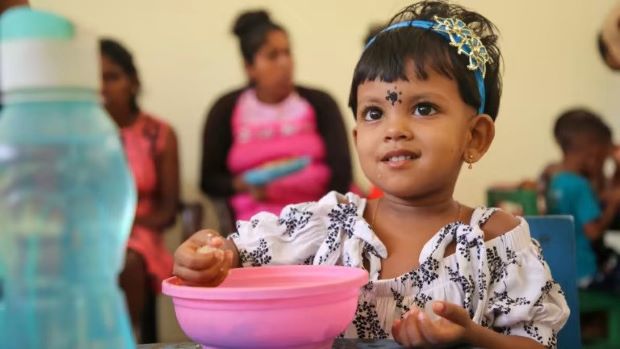Sri Lanka shows benefits of community-focused crisis support
By Roland Angerer
The world is in crisis. The aftermath of the COVID-19 pandemic has left societies and economies struggling.
Inflation is on the rise, food insecurity is mounting and job losses are daily occurrences. Economic recession is more than a possibility. And the threat of another pandemic, from a newer and deadlier virus, lurks in the background.
The world is experiencing its third global food crisis in 15 years. As of 2021, 193 million people faced acute hunger globally, according to an annual report compiled by humanitarian groups Concern Worldwide and Welthungerhilfe. It found that the problem is most acute in South Asia and sub-Saharan Africa.
Consequently, efforts to bounce back from recent disruptions need to be accelerated. Building community resilience and capacity through localization and empowerment should be priorities.
Devolution of power in the humanitarian response process is paramount. Communities that are empowered to take decisions and find sustainable solutions deeply embedded in their local context will be better equipped to respond to short- and long-term crises.
The COVID-19 pandemic, climate change and the war in Ukraine have caused supply chain disruptions, energy shortages and a global rise in prices for food, fertilizers and fuel. Among South Asian nations, Sri Lanka has been especially badly hit, experiencing the world’s sixth-highest food price inflation, according to the World Bank.
Food production there has fallen due to the unavailability of fertilizers and agrochemicals, amid a shortage of foreign currency. That has also reduced the country’s ability to import essential goods, impacting supplies of staples like rice, lentils, milk and cooking oil.
Fewer families in the country can afford two meals a day, let alone protein-rich, nutritious food. An estimated 2.3 million children – nearly half the nation’s children – now require some form of humanitarian support.
Cases of malnutrition, sexual abuse, physical assault and neglect are mounting while school dropout rates are on the rise. More parents are putting their children into state orphanages due to their inability to provide for them. Young adults, meanwhile, are unable to find work, further pushing them to the fringes of poverty.
Communities impacted by the humanitarian crisis have to deal with these consequences daily, but they are also looking further into the future to develop localized and sustainable approaches and solutions.
ChildFund International has come up with a bottom-up approach to respond to the island nation’s crisis, focused on what it calls community response hubs. Catalyzing change through these hubs empowers residents at the village level with a rights-based, inclusive approach that the community itself leads and owns.
The hubs ensure that local citizens play a pivotal role in designing, planning, implementing and monitoring interventions to address their and their children’s critical needs, including food security, nutrition, education, child protection, livelihood, youth civic engagement and psychosocial well-being.
Through community response hubs, ChildFund has set up community kitchens in places such as the Sri Lankan villages of Mayuragama and Weerapura. An average of 100 people participate in each community kitchen, mostly families with children under the age of 5.
The families gather three times a week in a central location to cook a protein-rich lunch together. There are currently 42 community kitchens around the island, together benefiting around 2,600 children as well as many pregnant and breastfeeding women. These hubs fill a critical gap, enabling children to get a healthy, nutrient-rich meal at least a few times each week.
“The community kitchen program has helped my child eat a healthy meal, consequently improving his weight,” said Minu, a 23-year-old pregnant woman who lives in Weerpura with her 5-year-old son Shenul. He was identified as severely underweight last August.
When the community kitchens are in service, mothers participate in health and hygiene workshops and children are led in play by local youth. These hubs also help families meet their nutritional needs by giving support for home gardening, instruction in basic food preservation skills and sponsoring self-help groups for bartering food.
The hubs bolster communities’ ability to respond to crises by building the capacity of local leaders and by providing technical and financial support for localized prioritization and decision-making.
Tailor-made interventions to support communities and ensure livelihoods, food security, child protection and education have included co-creation of seed banks, promotion of youth entrepreneurship, helping residents to turn home gardens into market-oriented small farms, forming and linking producer groups to markets, providing community-based supplementary educational support programs and facilitating age-appropriate development activities for preschool-age children.
At their core, the community response hubs are “of the people, by the people and for the people.” They involve building the capacity of communities with training, grooming and coaching as well as by exposing them to experiential learning. They ensure that different levels of a community’s power hierarchy are represented in core activities.
Responding to a humanitarian crisis anywhere requires systemic change and a bottom-up approach. The community response hub strategy could be replicated in other countries or regional contexts to serve as a catalyst for communities emerging out of a crisis to build resilience to deal with future disruptions.
Empowered communities can make better decisions for their children and youth, ensuring that they live healthily, get an education, are supported with livelihood opportunities and are provided with a safe and secure environment where they can thrive.
-Roland Angerer is Asia regional director for international aid group ChildFund International and this article was originally featured on asia.nikkei.com



Comments are closed, but trackbacks and pingbacks are open.